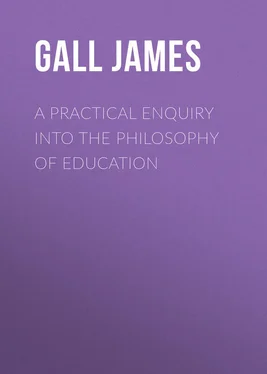James Gall - A Practical Enquiry into the Philosophy of Education
Здесь есть возможность читать онлайн «James Gall - A Practical Enquiry into the Philosophy of Education» — ознакомительный отрывок электронной книги совершенно бесплатно, а после прочтения отрывка купить полную версию. В некоторых случаях можно слушать аудио, скачать через торрент в формате fb2 и присутствует краткое содержание. Жанр: foreign_detective, foreign_antique, foreign_prose, на английском языке. Описание произведения, (предисловие) а так же отзывы посетителей доступны на портале библиотеки ЛибКат.
- Название:A Practical Enquiry into the Philosophy of Education
- Автор:
- Жанр:
- Год:неизвестен
- ISBN:нет данных
- Рейтинг книги:3 / 5. Голосов: 1
-
Избранное:Добавить в избранное
- Отзывы:
-
Ваша оценка:
- 60
- 1
- 2
- 3
- 4
- 5
A Practical Enquiry into the Philosophy of Education: краткое содержание, описание и аннотация
Предлагаем к чтению аннотацию, описание, краткое содержание или предисловие (зависит от того, что написал сам автор книги «A Practical Enquiry into the Philosophy of Education»). Если вы не нашли необходимую информацию о книге — напишите в комментариях, мы постараемся отыскать её.
A Practical Enquiry into the Philosophy of Education — читать онлайн ознакомительный отрывок
Ниже представлен текст книги, разбитый по страницам. Система сохранения места последней прочитанной страницы, позволяет с удобством читать онлайн бесплатно книгу «A Practical Enquiry into the Philosophy of Education», без необходимости каждый раз заново искать на чём Вы остановились. Поставьте закладку, и сможете в любой момент перейти на страницу, на которой закончили чтение.
Интервал:
Закладка:
These principles, having thus been established by science, are available for direction in the arts. The physician acts under their guidance; and his object is simply to regulate his treatment and advice in accordance with them. In other words, he endeavours to imitate Nature , to remove the obstructions which he finds interfering with her operations, or to lend that aid which a knowledge of these principles points out as necessary. The surgeon and the dentist follow the same course, but more directly. In healing a wound, for example, the surgeon has to ascertain from science how Nature in similar cases proceeds when left to herself; and all his cuttings, and lancings, and dressings, are nothing more than attempts to imitate her in her healing operations. So well is this now understood, that every operation which does not at least recognise the principle is denounced – and justly denounced – as quackery; and the reason is, that uniform experience has convinced professional men, that they can only expect success when they follow with docility in the path which Nature has pointed out to them.
Precisely similar should be the plan of operation pursued by the Educationist. He should, in the first place, take a comprehensive view of the whole subject, and endeavour to map out to himself its great natural divisions; – in other words, he should endeavour to ascertain what are the things which Nature teaches, that he may, by means of this great outline, form a general programme for the direction of the teacher. His next object ought to be, to ascertain the mode, and the means, adopted by Nature in forwarding these several departments of her educational process; the powers of mind engrossed in each; the order in which they are brought into exercise; and the combinations which she employs in perfecting them. In ascertaining these principles which regulate the operations of Nature in her educational processes, the same adherence to the rules prescribed by the inductive philosophy, which has crowned the other sciences with success, must be rigidly observed. There must be the same disregard of mere antiquity; there must be the same scrupulous sifting of evidence, and strict adherence to facts; there must be a discarding of all hypotheses, and a simple dependence upon ascertained truths alone. Adherence to these rules is as necessary in cultivating the science of education, as it has been in the other sciences; and the neglect of any one of them, may introduce an element of error, which may injure the labours of a whole lifetime.
We have some reason to fear, that although all this will be readily admitted in theory, it will be found somewhat difficult to adopt it in practice. The reason of this will be obvious when we reflect on the deep interest which the best and most philanthropic individuals in society take in this science. The other sciences are in some measure removed from the busy pursuits of life; they are the concern of certain persons, who are allowed to investigate and to experiment, to judge and to decide as they please, without the public in general caring much about the matter. – But education is a science of a different kind. Its value is acknowledged by every one, and its interests are dear to every benevolent heart. The individual who undertakes to examine, and more especially to promulgate, any new principle upon which education rests, will have a harder task to perform, and a severer battle to fight, than the philosopher who attempts to overturn a false conclusion in chemistry, or an erroneous principle in mechanics. Among the learned community, not more than one in a thousand perhaps is personally interested either in mechanics or in chemistry; and few others will enter the lists to oppose that which appears legitimate and fair. The enemies and opponents of the chemical reformer in that case may be zealous and even fierce; but they are few, and he enjoys the sympathy and the countenance of the great majority of those whose countenance is worthy of his regard. But when we calculate the number of those who take an interest in the subject of education, and those who do not, the above numbers will be reversed. Nine hundred and ninety-nine among the educated public will be found who take a real interest in the progress of education, for one who cares nothing about it.
This is a fearful odds where there is a likelihood of opposition; – and opposition may be expected. For there will be influences in many of the true friends of education, derived from old prejudices within, combined with the pressure of conflicting sentiments in their friends from without, which will render the task of establishing new and sound principles in this first of the sciences an irksome, and even a hazardous employment. Coldness or opposition from those whom we honour and love is always painful; and yet it should be endured, rather than that the best interests both of the present and future generations should be sacrificed. The opinions of all good men deserve consideration; – but when they are merely opinions, and are not founded on reason, they are at best but specious; and when they are opposed to truth, and are contrary to experience, a zealous adherence to them becomes sinful and dangerous. Such persons ought to commend, rather than blame, the reformer in education, when he declines to adopt ancient dogmas which he finds to be useless and hurtful: And at all events, if all have agreed to disregard the authority of an Aristotle or a Newton, when opposed to new facts and additional evidence, the Educationist must not allow himself to be driven from the path of fact and experience by either friends or enemies. No authority can make darkness light; – and although he may be opposed for a time, and the public mind may be abused for a moment, it will at last correct itself, and truth will prevail.
But the friends of education ought in no case to put the perseverance of those who labour for its improvement to so severe a trial. They ought in justice, as well as charity, to cultivate a forbearing and a candid spirit; and they will have many opportunities of exercising these virtues during the progress of this science. Education is confessedly but in its infancy; and therefore it must grow much, and change much, before it can arrive at maturity. But if there be an increasing opposition to all advance, and if a stumbling-block be continually thrown in the way of those who labour to perfect it, the labourers may be discouraged, and the work be indefinitely postponed. Let all such then guard against a blind opposition, or an attempt to explain away palpable facts, merely because they lead to principles which are new, or to conclusions which are at variance with their pre-conceived opinions. If they persevere in a blind opposition, they may find at last that they have been resisting truth, and defrauding their neighbour. Truth can never be the enemy of man, although many inadvertently rank themselves among its opponents. The resistance which has invariably been offered to every important discovery hitherto, should be a beacon to warn the inconsiderate and the prejudiced against being over-hasty in rejecting discoveries in education; and the obloquy that now rests on the memory of such persons, should be a warning to them, not to plant thorns in their own pillows, or now to sow "the wind, lest they at last should reap the whirlwind."
CHAP. III
On the Improvement of Teaching as an Art
As Education on account of its importance takes precedence in the sciences, so Teaching should rank first among the arts. The reasons for this arrangement are numerous; but the consideration of two will be sufficient. – The first is, that all the other arts refer chiefly to time, and the conveniences and comforts of this world; while the art of teaching not only includes all these, but involves also many of the interests of man through eternity. – And the second is, that without this art all the other arts would produce scarcely any advantage. Without education of some kind, men are, and must continue to be savages, – it being the only effectual instrument of civilization. It is the chief, if not the only means for improving the condition of the human family, and for restoring man to the dignity of an intelligent and virtuous being.
Читать дальшеИнтервал:
Закладка:
Похожие книги на «A Practical Enquiry into the Philosophy of Education»
Представляем Вашему вниманию похожие книги на «A Practical Enquiry into the Philosophy of Education» списком для выбора. Мы отобрали схожую по названию и смыслу литературу в надежде предоставить читателям больше вариантов отыскать новые, интересные, ещё непрочитанные произведения.
Обсуждение, отзывы о книге «A Practical Enquiry into the Philosophy of Education» и просто собственные мнения читателей. Оставьте ваши комментарии, напишите, что Вы думаете о произведении, его смысле или главных героях. Укажите что конкретно понравилось, а что нет, и почему Вы так считаете.










